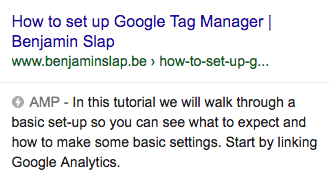How to set up AMP in WordPress
An introduction to AMP and why you should consider it
Accelerated Mobile Pages (AMP) is a fascinating technology to optimize the speed and user experience of your website on mobile devices. It is an open-source format in collaboration with Google, Twitter and several major publishers like BBC. If you are a developer or SEO campaign manager, you will cerntainly have stumbled upon it the last few years while conducting some searches on your mobile phone. With mobile usage increasinlgy growing, AMP provides the means to optimize your website in a whole new way.
A brief history on Accelerated Mobile Pages (AMP)
The AMP project was announced in October 2015 but it wasn’t until February 2016 when Google started to integrate it on its SERPs. Initially is was unclear if we were looking at a breakthrough technology or yet another try-out to change the way organic search results were generated. Two years on, it is safe to say AMP is here to stay for several good reasons:
- The use of mobile devices continues to grow, making it more important than ever to guarantee a fast delivery of your content
- Google has provided a dedicated part in its Search Console for Accelerated Mobile Pages, indicating this is to be more than a hype
- Mobile content is still largely consumed on low-bandwith connections. The faster your content is displayed on the user’s screen, the more likely you can get hem or her hooked to your site
- Google is putting more and more emphasis on mobile user experience. A few months ago, they have added a dedicated certification in their Partners programme for this.
- There’s a fair chance Google will give more priority to AMP-pages on mobile devices in the SERPs in the future, as they have done with mobile-optimized pages (remember Mobilegeddon back in 2015) and as they are doing now with https://.
Google already makes a visual distinction on mobile devices for AMP. Note the little light-grey bolt-icon:
So what makes Accelerated Mobile pages so special?
Basically, AMP loads almost instantly on mobile devices. Yes, as an SEO-minded developer, you should optimize your website anyway through all the known best-practices (clean code, minification of html, CSS and JavaScript, caching, …). But if you want to take mobile UX even further, Accelerated Mobile Pages can be a great help to outsmart your competitors.
- Read more: Optimize WordPress for speed – basic principles
- Read more: Optimize WordPress for speed – advanced techniques
There are infact three major components Accelarated Mobile Pages use:
- AMP html: largely the same as regular html but some elements use their own AMP specific tags
- AMP JS: Accelerated Mobile Pages use their own JavaScript library, thus eliminating the use of external time consuming libraries. Any use of external JavaScript is prohibited.
- AMP Cache: a proxy-based CDN to deliver validated pages
How to find out if AMP is the right tool for you
As is the case with any kind of technology: because it’s out there, doesn’t mean you should use it. AMP is a technology specifically made for publishers who put new content online regularly. So if you run a plain static website that doesn’t change too often overtime, Accelerated Mobile Pages are probably too time consuming to implement and not worth the benefit. However, if you run a blog and you put compelling stuff online every day or week, you might want to continue reading our future tutorials. There we will explain all the ins and outs of Accelerated Mobile Pages and you will learn how you can implement it on your WordPress website, even without the use of plugins.









